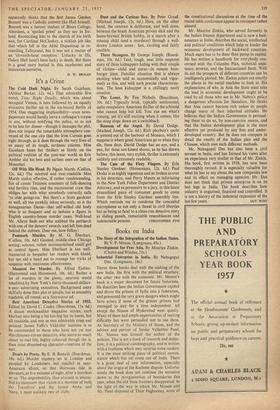Books on India
The Story of the Integration of the Indian States.
(Chatto and Windus, 21s.) Industrial Enterprise in India. By Nabagopal Das. (Longmans, 18s.)
THESE three books deal with the making of the new India, the first with the political structure, the other two with the economic. Mr. Menon's book is a major document for future historians. He describes how the Indian Government cajoled and drove the princes of India into a federation, and prevented the very grave dangers which might have arisen if some of the greater princes had managed to stay for a time independent. All except the Nizam of Hyderabad went quietly. Many of them had ample opportunities of making difficulty but were persuaded not to use them. As Secretary of the Ministry of States, and the adviser and partner of Sardar Vallabhai Patel, Mr. Menon was himself the author of the policies. This is not a book of research and deduc- tion; it is a political autobiography, and is written with a liveliness which may surprise some readers. It is the most striking piece of political remini- scence which has yet come out of India. There is a great deal of new information, especially about the origin of the Kashmir dispute. Unfortu- nately the book does not continue the narrative down to the reorganisation of boundaries this year, when the old State frontiers disappeared. In the light of the way in which Mr. Menon and Mr. Patel disposed of Their Highnesses. some of the constitutional discussions at the time of the round table conference appear in retrospect rather absurd.
Mr. Maurice Zinkin, who served formerly in the Indian finance department and is now a busi- nessman in India, describes the social, intellectual and political conditions which help or hinder the economic development of backward countries. Much more has to be done than pump in capital. He has written a handbook for everybody con- cerned with the Colombo Plan, technical assis- tance, SUNFED, and the International Bank. With its aid the prospects of different countries can be intelligently plotted. Mr. Zinkin points out exactly the places in the social machine to look at. His explanations of why in Asia the State must take the lead in economic development ought to be read by all those who see in Mr. Nehru's policy a dangerous affection for Socialism. He thinks that Asia cannot become rich unless its people change many of their inherited attitudes. He believes that the Indian Government is persuad- ing them to do so, by non-coercive means, and that the Indian development plan is the most effective yet produced by any free and under- developed country. But he does not compare in detail the results of the Indian plan and the Chinese, which uses such different methods.
Mr. Nabagopal Das has also been a civil servant in India, and has formed his views after an experience very similar to that of Mr. Zinkin. His book, first written in 1938, has now been thoroughly revised. It is especially valuable for what he has to say about the new companies law and its effect on managing agencies. Mr. Das does not think that private enterprise is on its last legs in India. The book describes how industry is organised, financed and controlled. It is not a history of the industrial expansion of the


































 Previous page
Previous page